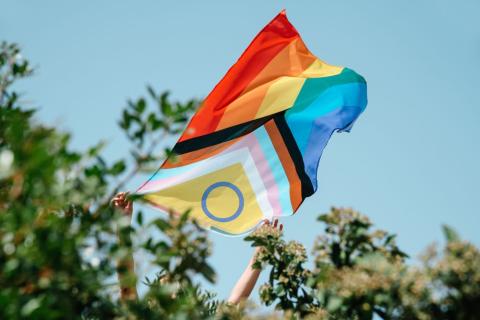Uniting Queer Farmers in the Granite State
On Tuesday, June 6, the USDA hosted a webinar on LGBTQI+ Mental Health in Agricultural Communities [Passcode: 0%Q@Ank$]. This powerful session, moderated by Dr. Jac Wypler (they/she), the Farmer Mental Health Director for the National Young Farmers Coalition, addressed the overlapping mental health risks experienced by farmers and members of the LGBTQ+ community, as well as the lack of research that specifically focuses on LGBTQ+ farmers. The panel included a discussion of some of the research that has been done, by Dr. Courtney Cuthbertson (they/them) of the University of Illinois. Dr. Cuthbertson noted many of the protective factors that help reduce mental health struggle and suicide risk rates. These included: self-identity affirmation, having LGBTQ+ companions, social support from friends, being out to co-workers, and a medium to high level of state policy support. Dr. Cuthbertson noted that when state policies are more supportive, people feel more comfortable being out, expressing who they are within their community rather than remaining closeted out of fear. These days, as state policies across many parts of the country are becoming less and less supportive, LGBTQ+ persons are often feeling increasingly unsafe and unable to be out, which adds to their stress and mental health struggles.
There is no data on the number of farmers nationwide who identify as members of the LGBTQ+ community, itself a large umbrella that includes a diverse range of experiences of gender and sexuality. According to the National Young Farmers Coalition’s 2022 Survey, 24% of young farmers (under age 40) surveyed identified with a sexuality other than heterosexual. This statistic doesn’t include the gender expansiveness present amongst farmers, nor does it reflect the diversity of genders and sexualities amongst older farmers.
The New Hampshire Queer Farmer Network, part of Extension’s Farm Strong program, aims to provide social and emotional support to all members of the LGBTQ+ community who farm or want to farm in New Hampshire. Through on-farm events across the state, we’ve built relationships and shared stories, connections that have already been life-changing and life-saving for some. Additionally, our virtual presence, through a listserv, monthly email blast, and Instagram, offers a safe space for queer farmers to relate and connect, even if they are not ready or able to do so in-person. Although most of the farmers involved fit the “young farmer” profile, we’ve provided support and connection to LGBTQ+ farmers of all ages. This has included assistance with projects, deep conversations around the challenges and joys of being a queer person today, and support around coming out. We hope to be able to offer ongoing support and community that explicitly affirms the diverse identities of farmers, fostering a deeper culture of safety and support that improves the social sustainability of farming for all.
In his remarks at the webinar, Matt Russell, the Iowa State Executive Director of the USDA Farm Service Agency, shared a story about how he and his husband were able to take in and support two struggling teens in their community. They were able to offer this vital assistance in their community not despite being gay but because of it, because of their particular situation in which they were two adults with no kids and the space and skills to take those kids in. The richness that LGBTQ+ individuals and families offer their communities varies widely, as we are so different in our experiences and identities and family structures. But regardless of what we bring, we benefit our communities not despite the fullness of who we are, but because of it. Matt Russell closed his comments, “Rural American cannot overcome its challenges unless diverse Americans are showing up. The future depends on all of us showing up and being who we are.” And we depend on policies and the funding of programs that help us feel safe showing up.
Contact nhqueerfarmers@gmail.com to learn more and to subscribe to our listserv. Follow us on Instagram @nhqueerfarmers for updates and reflections from the field.
Resources shared on the webinar
- National Suicide Prevention Lifeline - 988
- USDA Center for Faith Based and Neighborhood Partnerships
- USDA Rural Development
- Farmers.gov
- USDA Natural Resources Conservation Service
- LGBT National Hotline - 888-688-5428
- Trans Lifeline - 877-565-8860
- Not Our Farm
- Cultivemos
- Queer Farmers Network
- Equality USDA
- Jaclyn Wypler – Resources and Publications
- Surveying queer farmers: How heteropatriarchy affects farm viability and farmer well-being in U.S. agriculture
- SAGE
- Trevor Project - 866-488-7386, or text ‘START’ to 678-678
- North Central Farm and Ranch Stress Assistance Center
- Iowa Concern Hotline - 800-447-1985
- Western Region Agricultural Stress Assistance Program
- Farm Aid Farmer Resource Network
- Crisis Text Line - Text ‘HOME’ to 741741
- Cultivating Change Foundation
- Movement Advancement Project
- OutCare Health
- Inclusive Therapists
- USDA Beginning Farmers and Ranchers
- USDA Service Center Locator
